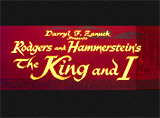
|
The King
and I (1956)
In director Walter Lang's film version of Richard
Rodgers and Oscar Hammerstein's 1951 Broadway hit musical (although
some numbers were cut from the original stage play) - the
musical drama was based upon real-life characters from the 1860s,
including English schoolteacher Anna Leonowens and the stubborn and
imperious King Mongkut of Siam. Controversy
arose over the historical accuracy of the film and its depiction
of the King, leading to the film's recent banning in Thailand.
The story had previously been presented in director
John Cromwell's Anna and the King of Siam (1946), starring Irene Dunne and Rex Harrison,
and then resurfaced in CBS-TV's 1972 13-episode (half-season) series, Anna
and the King (with Brynner and Samantha Eggar), and in another non-musical version --
director Andy Tennant's Anna and the King (1999),
starring Jodie Foster and Chow Yun-Fat.
The stage musical's choreographer Jerome Robbins also
worked on the film version. From its nine Academy Award nominations
(including Best Director, Best Actress, Best Director, and Best Cinematography),
it won five Oscars (Best Actor, Best Color Art Direction-Set Decoration,
Best Color Costume Design, Best Sound Recording, and Best Musical
Score).
- in the film's opening set
in 1862, widowed, prim and Victorian English (Welsh) schoolteacher/governess
Anna Leonowens (Deborah Kerr) arrived from Wales by ship (helmed
by Captain Orton (Charles Irwin)) in Bangkok, Siam (present-day
Thailand). Anna had been hired (for £ 20 pounds a month)
to be a schoolmistress to tutor the King's royal children in learning
English; she was accompanied by her excited
young son Louis (Rex Thompson)
- Louis asked if his mother was ever afraid and what
she did when frightened, prompting her to sing the tune: "I
Whistle A Happy Tune"
- they were greeted on board
the ship by a royal barge carrying "half-naked" Kralahome
(Martin Benson), King Mongkut's confidant ("right-hand man")
and Siam's Prime Minister; although believing that she had been
promised a house of her own, the strong-willed Anna was shocked
when the intimidating and stern Kralahome informed her that he
had come to escort them to their living quarters in the Royal Palace;
Anna decided that she must personally deliver her disagreement
to the arrogant King that her agreed-upon and promised "letter
of agreement" was to live outside the palace's walls
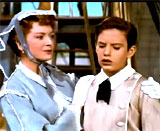
Widowed Anna's Arrival by Ship at Bangkok with Her
Son Louis
|
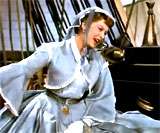
Anna: "I Whistle a Happy Tune"
|
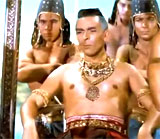
Siam's "Half-Naked" Prime Minister Kralahome (Martin Benson)
|
- the plucky Anna charged into the massive Throne
Room of autocratic King Mongkut (Yul Brynner in a star-making role),
who was sitting in his chambers; Anna watched from
the side as the King was being presented with the gift of a Burmese
slave-concubine named Tuptim (Rita Moreno, a Puerto Rican actress),
a present from the Prince of Burma; Tuptim was obviously in love
with the Burmese ambassador Lun Tha (Carlos Rivas) who had brought
her to the palace
- afterwards, although she was told the arrogant King
refused giving her an audience, Anna pushed forward; he brought her
into his harem room to introduce her to his many wives, and presented
his head wife to her - Lady Thiang (Terry Saunders) - known as "The
Number One" wife; the King
reinforced his order that Anna would be teaching his wives, in addition
to the children; he also remained adamant that Anna live and teach
in the palace
- during the sequence of "The
March of the Siamese Children,"
the King's fifteen children who were to be tutored were introduced,
including his eldest son and heir Prince Chulalongkorn (Patrick Adiarte);
charmed by the fifteen cute children (that were in the King's favor)
that she would be tutoring, Anna agreed to remain for the time being
(and live in the Palace), and the King was pleased
- in Anna's first night in the Palace, Lady Thiang and
some of the other giggling wives helped her to unpack; Anna fondly
recalled her love for her own late husband Tom, and sang a tribute to him: "Hello,
Young Lovers"
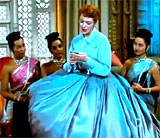
|
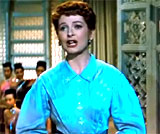
|
|
Anna's Thoughts About Her Beloved Deceased
Husband Tom: "Hello, Young Lovers"
|
- shortly later, the children
marched into the Palace, singing a song taught to them by Anna: "Home
Sweet Home (There's No Place Like Home)"; the King overheard them
and became perturbed and irritated that Anna was deliberately teaching
his children about the value of a home; she was obviously instructing
her pupils to sing "Home Sweet Home" and to learn proverbs
(such as "East or west, home is best" and "A man's
house is only less dear to him than his honor") - to remind
the King of his promise to give her a separate house to live in;
he also realized that advanced truths and new, more complicated
and confounding scientific wonders were also being taught by Anna
- to the future King
- the King contemplated to himself about
how the changing world of knowledge, due to education, was becoming
more complex, and sang a song titled: "A Puzzlement"
- during
one of the tutorial lessons, Lady Thiang pointed out the prominence
of Siam on an outdated map; Anna then displayed an updated map
of the world that displayed Siam as quite a small county, but she
diplomatically pointed out that her country of England was even
smaller; she also added that getting to know Siam's people and
its children was the most rewarding, before singing one of the
film's most memorable songs: "Getting to Know You"
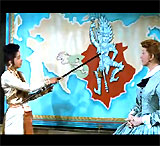
Lady Thiang's Lesson With an Old Map of the World
|
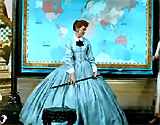
Anna's Lesson with a New Updated Map
|
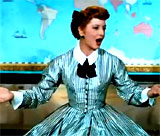
"Getting to Know You"
|
- when a disagreement and chaos erupted between the
children and Anna over her lesson about ice and snow (something
they had never seen), the King interrupted the classroom and ordered
the children to be open to learn new things: ("Never let me
hear of not believing schoolteacher whom I have bring here at high
expense...I command all of you to make most of this opportunity
for expensive education")
- the King happened to notice an unapproved study
book in Tuptim's hands - a copy of The Small House of Uncle
Thomas (aka Uncle Tom's Cabin), written by Harriet Beecher
Stowe; the King and Anna briefly spoke about the institution of
slavery, and President Lincoln's strategy to win the Civil War
in America to end slavery; the heir Prince was resistant to laws
that would end slavery in Siam; shortly later, Prime Minister
Kralahome privately expressed his concern that Anna's teachings
were contrary to the country's traditional ways, and that she was
duping herself to believe that she could change the stubborn King's
opinions, and would eventually end up as the King's slave
- later in the middle of the night, Anna was summoned
to King Mongkut's private chambers; he discussed how he firmly disagreed
with the Bible's account of 6 days of creation, and then ordered
Anna to take dictation for a letter to President Lincoln; first
however, he realized that Anna was towering over him - prohibited
by ancient customs, and ordered
that her head should never be higher than his; when she refused to
grovel on the floor, he quipped: "You are very difficult woman!";
he then repeated that in any public settings, all subjects should
obey, followed by his familiar string of
etceteras: ("Observe care that head shall not be higher than
mine. When I shall sit, you shall sit! When I shall kneel, you
shall kneel. Et cetera, et cetera, et cetera!"); she promised
to follow his lead
- the King then returned to the subject of the dictated
letter, and his worries about the President's strategy of not using
elephants to help win the Civil War. He offered military support
by sending pairs of MALE elephants that would multiply after the
war and become beasts of burden - an idea that Anna had to refine
and correct for him before mailing the letter (King: "You put in
the details")
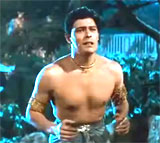
Burmese Ambassador Lun Tha (Carlos Rivas)
|
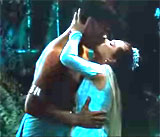
In Love With Tuptim, Singing:
"We Kiss In a Shadow"
|
- as Anna left the King's chambers, in the outdoor
garden, she was met by the Burmese Ambassador Lun Tha, who told
her that he had seen his lover Tuptim twice in secret; he requested
for Anna to arrange a rendezvous between them; at first, she refused
the dangerous request, but then changed her mind; the two lovers
met in the dark, and sang "We Kiss in a Shadow"; afterwards, Lun
Tha promised that he would one day return to free Tuptim and escape
with her
- meanwhile, the King became
more and more troubled and apprehensive when his Prime Minister
Kralahome brought rumors and reports of "Western treachery" and
the spread of British imperialism that regarded the King as an "unfit" ruler
of Siam; he took his anger out at Anna - as his scapegoat - he was
reminded of her accusations that he didn't keep his promise to
provide her with a house, and ordered her to never present the
singing lesson of "Home Sweet Home" again; she disapprovingly stood
up to his autocratic rule, refused to be called his "servant" ("I
am most certainly not your servant!"), and threatened
to resign, leave and return to England
- following Anna's violent disagreement
with the King, Lady Thiang visited her in her bedroom to plead
with her to provide guidance and advice to the distressed and anxious
King Mongkut, who had been called a "barbarian" and
feared having his kingdom overthrown and turned into a protectorate; Anna
was upset by the accusations, but was still prideful
and reluctant to immediately give in to the close-minded King; after
Lady Thiang sang: "Something Wonderful" about the King's personality,
Anna relented
- in the King's presence, when he spoke to Anna of
news from Singapore about how the British regarded him as a "barbarian,"
she skillfully was able to provide her reasoned guidance by suggesting
that he personally host and honor the foreign guests with a high-class
banquet (with European food and music); the two "distinguished"
British envoys arriving from Singapore for a "friendship tour" in
one week were Ambassador Sir John Hay (Alan Mowbray) and Sir Edward
Ramsay (Geoffrey Toone) (one of Anna's old admirers before she was
married)
- during prayers to Buddha to bless the upcoming event,
the grateful King promised to build Anna a house, in exchange for
her help: "And Buddha, I promise you that I shall give this
unworthy woman a house"
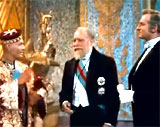
The King with the Two British Envoys at Banquet
|
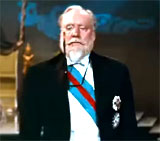
Ambassador Sir John Hay
|
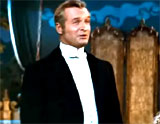
Sir Edward Ramsay
|
- the arrival of the two British envoys at the banquet
initially went well, although there were a few moments of embarrassment
when the "royal wives" lacked undergarments and were startled by
the bearded, monocle-wearing Ambassador; during a private dance
with Anna, Sir Edward attempted to rekindle romance with her,
as he spoke about "old times," but she affirmed that she was being
fulfilled by bringing education to the people of Siam
- during the banquet, the King's main objective was
to present a good impression and appear to be an intellectual conversationalist;
toasts were presented by the Ambassador: "His Gracious
Majesty, the King of Siam: May the rest of the world always regard
him with the same high esteem as does the government of Her Majesty,
Queen Victoria"
- to provide theatrical entertainment
for the guests, Tuptim narrated her seditious version
of Harriet Beecher Stowe's controversial, anti-slavery novel Uncle
Tom's Cabin, known as The Small House of Uncle Thomas - it was presented as a traditional
Siamese ballet (performed as a "play within a play");
characters in the retelling included "Poor Eliza Poor unfortunate
slave, Eliza's lord and master: King Simon of Legree. She hates her
lord and master and fears him"; in the tale, Eliza was able to escape
from the wicked slave-owner
- when the play was almost over,
narrator Tuptim left her seat and added her own personal assessment: "...I
too am glad for death of king. Of any king who pursue a slave who
is unhappy and who tried to escape. And Your Majesty, I wish to
say to you: I beg of you!"
Her words were interpreted as a personal affront to the King. The King
snapped his fingers at her to force her to end the performance
- the
story concluded with both a happy and sad sacrificial ending: ("Is
very sad ending, with sacrifice"). Poor little Eva (a "poor
unfortunate child") was taken to be with Buddha: ("Is Buddha's
wish that Eva come to him and thank him personally for saving of Eliza
and baby. And so she die and go to arms of Buddha")
- when the ballet ended, there
was wild applause from the guests, although the King (and the Kralahome)
were perturbed by the underlying anti-slavery message threatening
their power; the Ambassador called for special
attention to be awarded to the "Author," but when the camera
panned to the right, Tuptim's chair was empty - with a chaba flower.
Tuptim had disappeared as the play ended, to run away from her own
enslavement to join her lover Lun Tha
- after the British departed, the King and Anna had
a short discussion about his misogynistic attitudes toward women,
and his powerful sense of entitlement to possessively keep multiple women in his harem.
She was especially upset about his illogical claim that women were
naturally expected to please men and to remain faithful, but men
could be rampant and promiscuous philanderers; the King regarded
men who remained faithful to one woman as "sick." Anna,
on the other hand, believed in the Western practice of single-partner monogamy
- Anna recalled the exciting thrill of her first
dance as a young girl, and then in an iconic, joyous
dance segment, Anna taught the barefooted monarch how to polka,
as they happily swirled around the room, while singing: "Shall
We Dance"
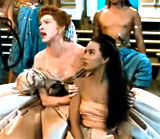
Anna Begging for Mercy for Tuptim
|
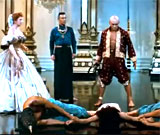
Tuptim Spread-Eagled on the Floor
|
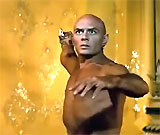
The King About to Personally Whip Tuptim
|
- the two were interrupted by news from the Kralahome
of Tuptim's capture, and the King ordered that his dishonored slave-wife
should be whipped; when Tuptim ran into the room to seek mercy,
Anna defended her: "She's only a child, running away because she was unhappy. Can't you understand
that?"; a concerned Anna yelled out that the King had no heart and was incapable
of loving anyone; ignoring her pleas, the King grabbed the
whip to personally punish the girl; after Anna called him a "barbarian,"
he asserted "There is no barbarian worse than a weak king" and
was about to strike, but crumpled over, grabbed his chest and raced
from the room; then, a report arrived that the body of Tuptim's lover
was found in a river, and Tuptim reacted
in shock as she was led away in tears
- the Prime Minister - the Kralahome - blamed Anna
for destroying the King and his reputation; Anna returned the King's
gift of a ring, cut off all of her responsibilities as a governess,
and declared that she would be leaving on the next boat out of
Siam with her son Louis
- a few weeks later before Anna's departure back to
England, Lady Thiang came to Anna's quarters with news that the King
was dying. Anna asked about the circumstances and was told that the
despairing King had completely isolated himself, shut himself
away in disgrace, and starved himself
- Lady Thiang brought an unfinished letter from the King that he had struggled
to write when he learned of her departure. Anna read the letter out-loud
in the Prince's presence - it expressed the King's deep gratitude
and respect although they often clashed over major differences;
moved by the letter, Anna became tearful and decided to visit the
King at his bedside before departing
- in the King's
emotional deathbed scene, he shared how the people of Siam and the
children would miss her very much; he also joked with her that
her head was higher than his; he returned the ring that she had
given back and insisted that she wear it, before his many children
were brought in to surround his bed; one young Princess recited
a memorized message about how Anna would leave them in darkness
without her instruction; Anna decided to stay and made a promise
to remain in Bangkok to provide guidance for the future king
- the newly-appointed young Prince issued
two proclamations to his subjects, and became more resolute as he
spoke about how he would no longer require bowing before
the King, as the ex-King quietly expired nearby: ("There
shall be no bowing like toad. No crouching. No crawling. This
does not mean, however, that you do not show respect for
king. You will stand with shoulders back and chin high, like
this. You will face king with proud expression showing pride
in self as well as in king. This is proper way for men to
show esteem for one another by looking upon each other's
faces with calmness of spirit, eyes meeting eyes in equal
gaze, bodies upright, standing as men were meant to stand
with dignity and awareness of self. So from this day forward...")
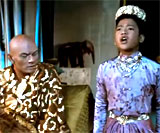
Young Prince's First of Two Proclamations
|
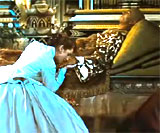
Anna's Tearful Farewell
|
- in the film's final moment, Anna placed her face
next to the King's limp left hand following his death
|
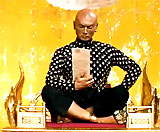
First View of King Mongkut of Siam (Yul Brynner) in His Throne Room
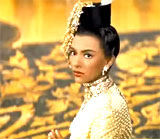
Burmese Slave Tuptim (Rita Moreno), a Gift from the
Prince of Burma to the King
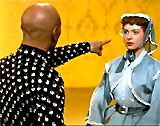
The King Confronting the Plucky Anna
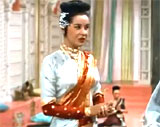
The King's Number One Wife,
Lady Thiang (Terry Saunders)
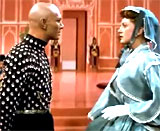
King to Anna: "You shall live in palace"
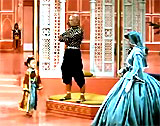
"The March of the Siamese Children" Before Anna
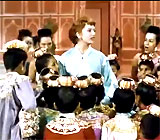
Anna Surrounded by Children
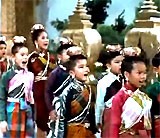
"Home Sweet Home" - Sung by Children
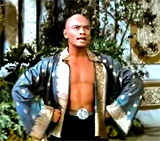
"A Puzzlement" - Sung by the King
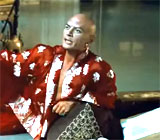
The King Reading the Bible About the Story of Creation - Reclining on
Floor
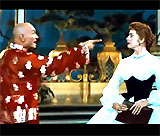
King to Anna: "You are very difficult woman!"
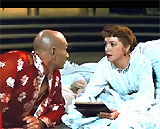
The King Dictating Letter to President Lincoln to Anna
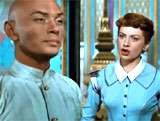
King and Anna: "And you did promise me a house!"
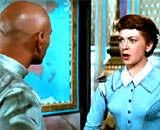
"I am most certainly not your servant!"
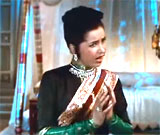
Lady Thiang: "Something Wonderful"
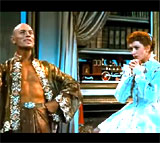
Anna Skillfully Offering Political Advice to the King - Host the Two
British Envoys with a First-Class European-styled Banquet
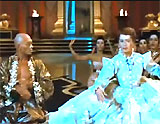
King's Prayer to Buddha To Build a House for Anna
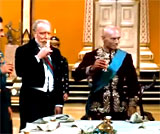
Toasts with the British Ambassador at the Banquet
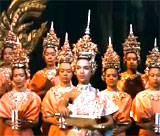
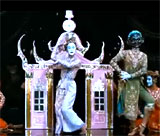
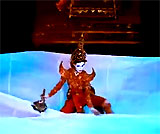
Tuptim's Narration of Her Balletic Interpretation of Uncle Tom's Cabin
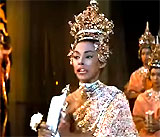
Tuptim's Personal Affront to the Slave-Owning King
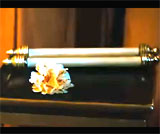
Tuptim's Chair - With a Chaba Flower
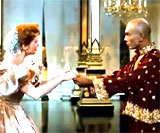
"Shall We Dance"
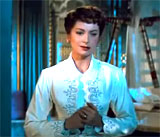
Anna's Last Night in Siam
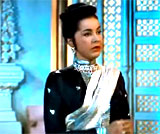
Lady Thiang's News to Anna of the King's Imminent Death
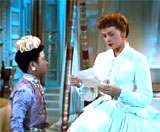
Anna Reading the King's Letter Outloud
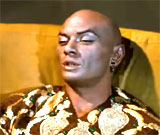
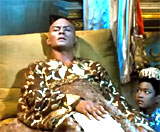
The King on His Deathbed
|






























